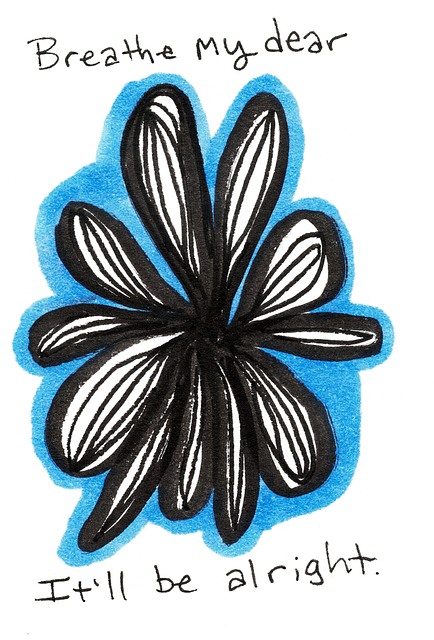Arvada Domestic Violence Therapy is a specialized center addressing anxiety disorders and their impact on survivors of domestic violence. They offer personalized CBT, mindfulness practices, and holistic approaches like Social Skills Training and Compassion Cultivation to help clients manage anxiety, overcome trauma, and build resilience. By focusing on thought patterns, self-care, cultural sensitivity, and emotional healing, Arvada Domestic Violence Therapy provides long-term strategies for stress reduction and improved mental well-being.
Anxiety is a prevalent challenge, affecting millions worldwide. This article guides you through effective management techniques, offering valuable insights into recognizing anxiety’s subtle signs and symptoms. We explore the profound impact of domestic violence on mental health and its connection to anxiety disorders.
From evidence-based Cognitive Behavioral Therapy (CBT) to mindfulness practices, we provide practical strategies for long-term relief. Additionally, discover building resilience as a powerful tool, helping individuals in Arvada and beyond overcome anxiety and lead fulfilling lives.
- Understanding Anxiety: Recognizing the Signs and Symptoms
- The Impact of Domestic Violence on Mental Health
- Cognitive Behavioral Therapy (CBT): A Powerful Tool for Anxiety Management
- Mindfulness Practices for Reducing Anxiety and Stress
- Building Resilience: Coping Strategies for Long-Term Anxiety Relief
Understanding Anxiety: Recognizing the Signs and Symptoms

Anxiety is a natural response to stress or perceived threats, but when it becomes overwhelming and persistent, it can significantly impact daily life. Recognizing the signs and symptoms of anxiety is the first step towards managing it effectively. Common indicators include rapid heartbeat, sweating, restlessness, difficulty concentrating, and feelings of dread or fear. These physical and emotional sensations often manifest in various ways, such as panic attacks, excessive worry, or avoidance behaviors.
At Arvada Domestic Violence Therapy, we understand that anxiety disorders can vary widely, from generalized anxiety to more severe conditions like post-traumatic stress disorder (PTSD). Our experienced therapists help individuals identify their specific triggers and develop personalized strategies for coping. Through therapeutic processes focused on emotional healing and confidence boosting, we guide clients towards effective stress reduction methods tailored to their unique needs.
The Impact of Domestic Violence on Mental Health

The impact of domestic violence on mental health cannot be overstated. Experiencing or witnessing abuse at home can lead to severe and lasting psychological effects. Victims often struggle with anxiety, depression, post-traumatic stress disorder (PTSD), and low self-esteem, among other issues. Arvada Domestic Violence Therapy offers specialized support for individuals dealing with these challenges, providing a safe space to process trauma and develop coping strategies.
Social Skills Training and Compassion Cultivation Practices have been proven effective in helping survivors rebuild their lives. These techniques not only address the immediate mental health concerns but also foster resilience and self-compassion, which are crucial for long-term recovery. By integrating these practices into therapy, Arvada Domestic Violence Therapy aims to empower individuals to break free from cycles of abuse and prevent depression, ensuring they have the tools needed to thrive beyond their traumatic experiences.
Cognitive Behavioral Therapy (CBT): A Powerful Tool for Anxiety Management

Cognitive Behavioral Therapy (CBT) is a highly effective anxiety management technique that has helped countless individuals across various settings, including Arvada Domestic Violence Therapy. CBT focuses on identifying and challenging negative thought patterns and behaviors that contribute to anxiety disorders. By understanding how thoughts, feelings, and actions are interconnected, CBT empowers individuals to reframe their perspectives and adopt healthier coping mechanisms.
This therapeutic approach encourages active participation in one’s mental health journey. Through structured sessions, individuals learn valuable self-care practices, such as journaling, mindfulness exercises, and relaxation techniques, which contribute to improved mood management. Moreover, CBT integrates mental health policy analysis and advocacy by promoting a deeper understanding of the impact of societal factors on anxiety, encouraging clients to become advocates for their own well-being and advocating for broader mental health support systems.
Mindfulness Practices for Reducing Anxiety and Stress

In today’s fast-paced world, anxiety and stress have become all too common companions. However, mindfulness practices offer a powerful tool for managing these feelings, providing a sense of calm amidst chaos. Techniques such as meditation, deep breathing exercises, and mindful walking can help individuals stay grounded in the present moment, thereby reducing the impact of anxious thoughts and worries. By focusing on the here and now, rather than dwelling on past mistakes or future anxieties, people can cultivate mental wellness and enhance their overall quality of life.
Arvada Domestic Violence Therapy, while primarily focused on addressing relationship issues, also recognizes the importance of mental wellness and empathy building strategies. Mindfulness practices are often integrated into therapy sessions to help clients manage mood swings and reduce stress levels. These techniques not only foster a deeper sense of self-awareness but also equip individuals with valuable tools for navigating life’s challenges. Through regular practice, one can cultivate resilience and a more positive outlook, ultimately leading to better mood management and improved relationships.
Building Resilience: Coping Strategies for Long-Term Anxiety Relief

Building resilience is a powerful tool in managing anxiety over the long term. It involves developing coping strategies that enable individuals to navigate stressful situations with greater ease and maintain emotional balance. Through Arvada Domestic Violence Therapy and other specialized programs, individuals can learn techniques such as mindfulness meditation, deep breathing exercises, and cognitive reframing. These practices help reduce symptoms of anxiety by promoting relaxation responses and challenging negative thought patterns.
Moreover, fostering emotional well-being promotion techniques, like engaging in regular physical activity and cultivating a supportive social network, plays a significant role in resilience building. Cultural sensitivity in mental healthcare practice is also essential, ensuring that coping strategies are tailored to the individual’s unique cultural background and context. By addressing the root causes of anxiety and providing effective tools for management, these comprehensive approaches contribute to lasting relief and improved quality of life, breaking down barriers associated with mental illness stigma reduction efforts.
Anxiety management is a journey that requires understanding, tools, and resilience. By recognizing signs early, addressing domestic violence’s profound impact on mental health, and adopting evidence-based methods like CBT, individuals can gain significant control over their anxiety. Integrating mindfulness practices into daily routines offers additional stress reduction while building coping strategies for long-term resilience. For those in Arvada facing domestic violence, specialized therapy is a crucial step towards healing and reclaiming life. Remember, with the right support and techniques, managing anxiety is achievable, fostering a brighter, more serene future.














